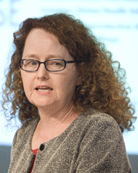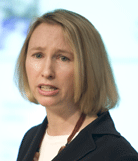Rebuilding Reproductive Health Systems in Post-Conflict Settings
Countries affected by conflict often have high maternal mortality and morbidity rates. Experts discussed the need for evidence-based research for recovery and rebuilding of reproductive health systems in post-conflict settings.
Overview
"Seven of the thirteen lowest ranked countries in maternal mortality are countries that are affected by either conflict or instability", stated Dr. Ribka Amsalu, Emergency Health Advisor for Save the Children. The people most affected are refugees and internally displaced persons (IDPs), both of which have increased in number over the last decade–leading to staggeringly high mortality and morbidity rates. Amsalu, along with Dr. Therese McGinn, Director Reproductive Health Access, Information and Services in Emergencies Initiative (RAISE) and Meriwether Beatty, Reproductive Health Project Director, John Snow Inc discussed the need for evidence-based research for recovery and rebuilding of reproductive health systems in post-conflict settings.
Implementing the Minimum Initial Service Package in Times of Crisis
Dr. Ribka Amsalu opened the event by discussing statistical trends among refugee and IDP populations. "There are more than 35 million people that have been displaced and affected by natural disasters and conflict", stated Amsalu. As a result, a large portion of the population is socially and politically marginalized and becomes vulnerable to violence. Their livelihood is negatively impacted and their existing social networks are disrupted
The problems do not end here. In Sudan, Columbia, Iraq, the Democratic Republic of the Congo (DRC) and Somalia, which have the highest numbers of displaced persons, the issue is compounded by competing priorities. Lack of food, shelter, water, and health care are all pressing matters, but it is difficult to provide attention to all of them. Amsalu argued that the causes for maternal mortality do not change "whether it's in a crisis setting or a non-crisis setting, the interventions are similar and have been documented to be effective".
Amsalu argued for the uptake of the Minimum Initial Service Package (MISP) for addressing reproductive health in crisis situations. The MISP aims to reduce mortality and morbidity through provision of clean home deliveries, access to emergency obstetric care, comprehensive HIV/AIDS prevention programs, prevention and management of sexual violence, and building and monitoring comprehensive reproductive health facilities. In support of the MISP, Amsalu remarked "you can achieve success, even though there are many challenges, be it security, logistics or funding–it is doable, and evidence-based interventions can be implemented".
Collecting Data for Building Reproductive Health Services
 Dr. Therese McGinn argued that reproductive health interventions need to be adapted according to the nature and stage of the conflict. Highlighting this issue, McGinn pointed to the DRC, which, it could be argued, is both in an active and post-conflict state, and as such requires a broad, comprehensive approach. "The pattern in the world isn't six months of conflict and then everything is back to normal, [conflict] goes on for decades and during that time very little development happens in the reproductive health sector".
Dr. Therese McGinn argued that reproductive health interventions need to be adapted according to the nature and stage of the conflict. Highlighting this issue, McGinn pointed to the DRC, which, it could be argued, is both in an active and post-conflict state, and as such requires a broad, comprehensive approach. "The pattern in the world isn't six months of conflict and then everything is back to normal, [conflict] goes on for decades and during that time very little development happens in the reproductive health sector".
It is challenging to maintain a stable health system during the conflict. "You can't ask what your policy on mid-level providers is–there isn't any policy", argued McGinn. As a result it is harder to provide services for reproductive health because logistics, training, and monitoring all have to be started from scratch. "Traditionally, development professionals have left refugees out of their efforts, because other groups take care of them and the refugee and relief professionals leave reproductive health out because it's not a standard part of their package." Thus, the issue of reproductive health gets left off of everyone's agenda.
One of RAISE's primary objectives is placing reproductive health back on to people's agendas, and collects data from different countries and partner agencies to disseminate information in a meaningful way that helps guide decision makers. "Our job is to provide the technical expertise, the support and guidance, so they don't have to go through the trial and error that other countries have gone through", stated McGinn.
Relief Models in Liberia, Haiti, and Pakistan
 "You need quick results, but more importantly, you need good results. It's this mindset – getting away from the pressure of immediate reaction and response", said Meriwether Beatty commenting on the challenging task of providing immediate disaster relief, then following it up with long-term sustainable development.
"You need quick results, but more importantly, you need good results. It's this mindset – getting away from the pressure of immediate reaction and response", said Meriwether Beatty commenting on the challenging task of providing immediate disaster relief, then following it up with long-term sustainable development.
The average length of displacement is 17 to 19 years, so it is imperative to provide relief services during the conflict, but also after it. "Sometimes, we don't realize that the situation could be just as bad in the transition stage as in the emergency stage", shared Beatty. Thus, Beatty advocated for local NGO leadership in rebuilding reproductive health services as they are closest to the community in need of assistance. They can complement other health services and strengthen the linkages between civil society, government, and international agencies.
Liberia has been able to achieve a balance between providing critical emergency services and long-term, sustainable solutions. These outcomes have been achieved in large part due to the experience of the Liberian people, encouraged by their social conditions, and have been maintained by the drive to develop internal capacities. However, Haiti has had much less success in reconciling the two distinct goals of disaster relief and long-term development. Though theoretically Haiti is now stabilized, it still seems to be following the model of a country in crisis. Pakistan, however, lies in-between both models. Though it has shown some potential for achieving both goals by building the capacity of the current health system and fostering a community-based approach, it still has a long way to go, to ensure continuum of care.
Rebuilding health systems in post-conflict settings is critical to long-term sustainable health and the overall well-being of a country. It is important for NGO's, development professionals and health care workers to make this issue a top priority. All three speakers acknowledged the pressing need to continue to evaluate all health needs in post-conflict settings in order to improve policymaking and program development.
Drafted by Zahra Ashraf and edited by Gib Clarke.
Documents & Downloads
Speakers
Hosted By

Maternal Health Initiative
Life and health are the most basic human rights, yet disparities between and within countries continue to grow. No single solution or institution can address the variety of health concerns the world faces. By leveraging, building on, and coordinating the Wilson Center’s strong regional and cross-cutting programming, the Maternal Health Initiative (MHI) promotes dialogue and understanding among practitioners, scholars, community leaders, and policymakers. Read more

Environmental Change and Security Program
The Environmental Change and Security Program (ECSP) explores the connections between environmental change, health, and population dynamics and their links to conflict, human insecurity, and foreign policy. Read more
Thank you for your interest in this event. Please send any feedback or questions to our Events staff.










